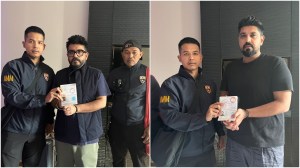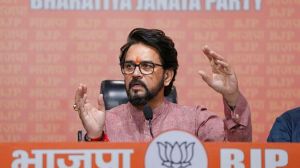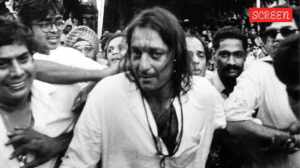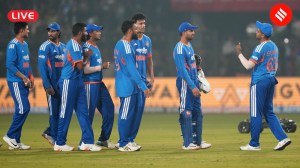Decoding Gujarat verdict: In Narmada, home to PM Modi’s Sardar Patel statue project, BJP crumbles
On Monday, Congress workers in Dediapada broke into celebrations after Bhartiya Tribal Party president Mahesh Vasava won by a margin of 21,700 votes against sitting MLA Motisinh Vasava.
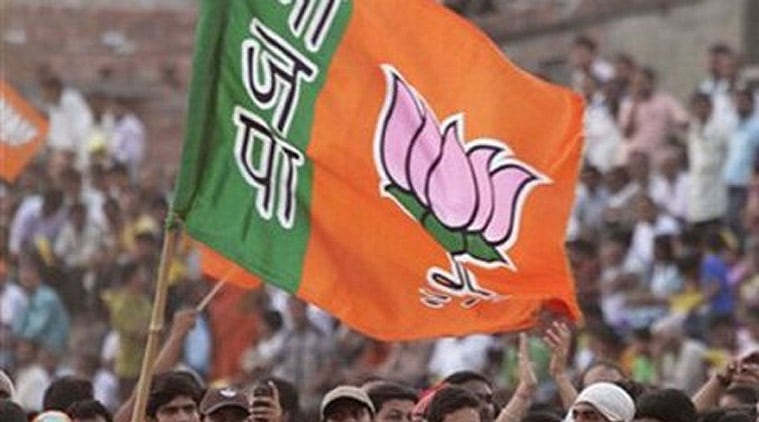 BJP’s wipeout from Narmada district, where PM Modi arrived on September 17 to inaugurate the Narmada Dam after the work of installation of 30 flood gates was complete, has certainly come as a jolt to the BJP.
BJP’s wipeout from Narmada district, where PM Modi arrived on September 17 to inaugurate the Narmada Dam after the work of installation of 30 flood gates was complete, has certainly come as a jolt to the BJP.
In May this year, several months before he began his Navsarjan Yatra in Gujarat, Congress president Rahul Gandhi held a public meeting in Dediapada, a tribal-dominated Assembly constituency, in Narmada district. Before addressing tribals who had gathered in large numbers to hear him, Rahul paid a visit to Goddess Panduri temple in Dev Mogra, about 25 km from Dediapada, where in the visitor’s book he wrote, “Thank you for a wonderful visit. I look forward to coming back here soon. May Yahamogi Panduri Mataji bless Gujarat and all of us to bring happiness and prosperity to the state.” Sources in the temple said that the head priest of the temple blessed Rahul and prayed for him to become “the Prime Minister in 2019.”
On Monday, Congress workers in Dediapada broke into celebrations after Bhartiya Tribal Party president Mahesh Vasava won by a margin of 21,700 votes against sitting MLA Motisinh Vasava. The Congress had entered into a pre-poll alliance with the BTP, which initially had irked the party’s local cadre. But in the end, they got together to campaign against the BJP in the end.
“Initially, there was resentment as the party cadre had worked very hard for the seat. So, they also wrote to the central Congress leaders to reconsider the decision to share the seat with the BTP. But as the election approached and due to intervention by senior leaders, the local unit campaigned for Vasava,” a Congress leader said.
Also read | Decoding the BJP’s victories: Trends of continuity with some significant change
It was not only in Dediapada, but also in Nandod Assembly segment in the district where the BJP suffered a big upset, losing its hold in the tribal district completely. The BJP’s high-pitched appeal that the Statue of Unity — Prime Minister Narendra Modi’s pet project of erecting the 182-metre-tall statue of Sardar Vallabhbhai Patel — would change the fortunes of the tribals here brought no dividends. The BJP’s defeat in Nandod has put the party’s leaders in an embarrassing spot.
Sitting MLA and State Minister for Forest and Tribal Development Shabdasharan Tadvi lost to Congress’s Premsinh Vasava. Tadvi, who contested for the first time in 2012, had the advantage of the constituency with a substantial Tadvi population following the delimitation. However the poll results indicate that even in the 14 polling booths surrounding the Statue of Unity, the Congress won by a margin of 5,157 votes.
The BJP’s wipeout from Narmada district, where Prime Minister Narendra Modi arrived on September 17 to inaugurate the Narmada Dam after the work of installation of 30 flood gates was complete, has certainly come as a jolt to the BJP.
“It has certainly come as a bolt from the blue. Losing Narmada was not part of our calculations, although we knew that many factors would lower the tally in the state. We were aiming for 150 and Narmada was a crucial factor. However, this defeat does not mean that the idea of Statue of Unity has been rejected by the people. In fact, the BJP has consolidated its position in Dabhoi and other seats in Vadodara district as well as Bharuch —all places that will directly benefit from the tourism that Statue of Unity will bring,” a senior BJP leader said.
Many BJP leaders, however, said that resentment among the tribals against the government for recognising many communities that are not native tribals as Scheduled Tribes has cost the party dearly in Narmada.
In September, BJP MP from Bharuch Mansukh Vasava had sent a letter to the National Commission for Scheduled Tribes urging that certain communities from North Gujarat, identified by the Gujarat government as Scheduled Tribes, must be immediately “dropped”. The letter was aimed at communities such as the Bharwads, Rabaris and Siddi Muslim. During poll campaign, Vasava used to speak about “real tribals” of Gujarat being “kept away from employment opportunities by groups with vested interests, who have included other communities as tribals”.
- 01
- 02
- 03
- 04
- 05








